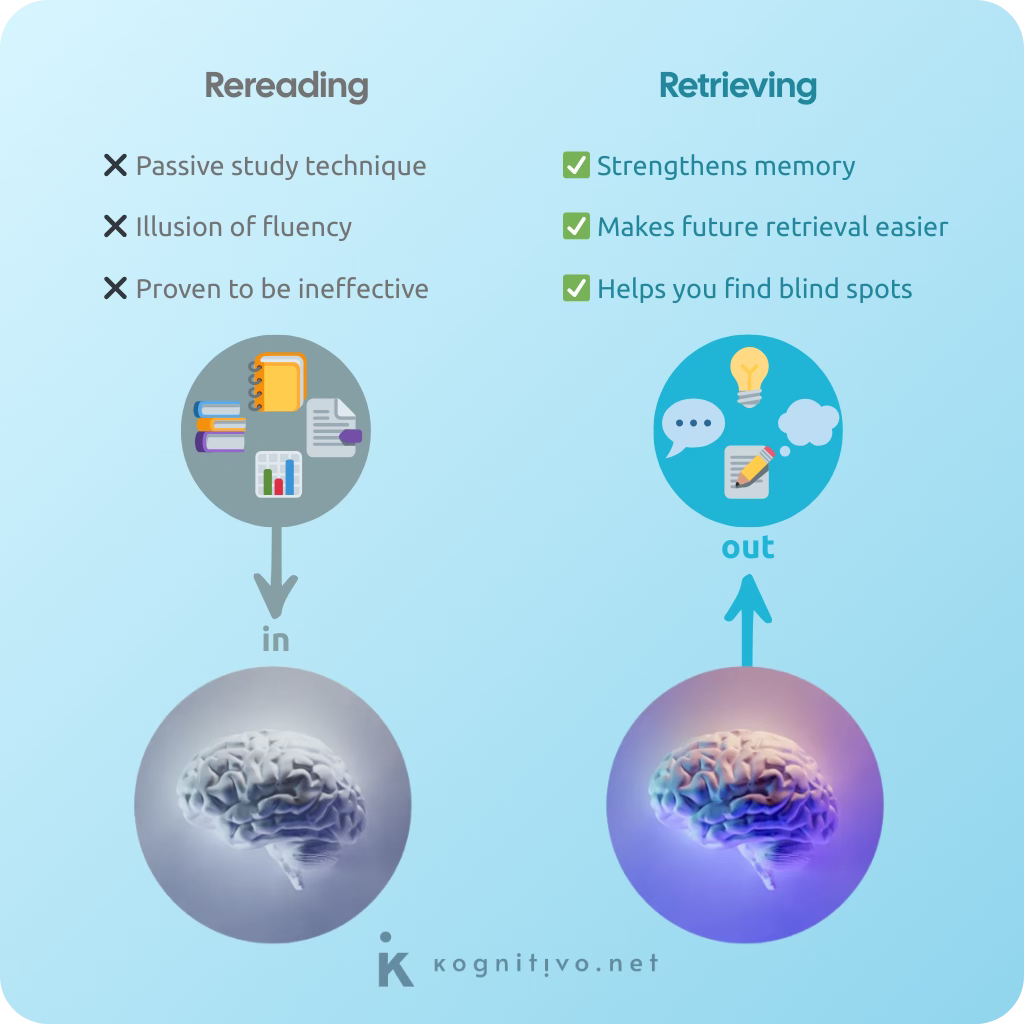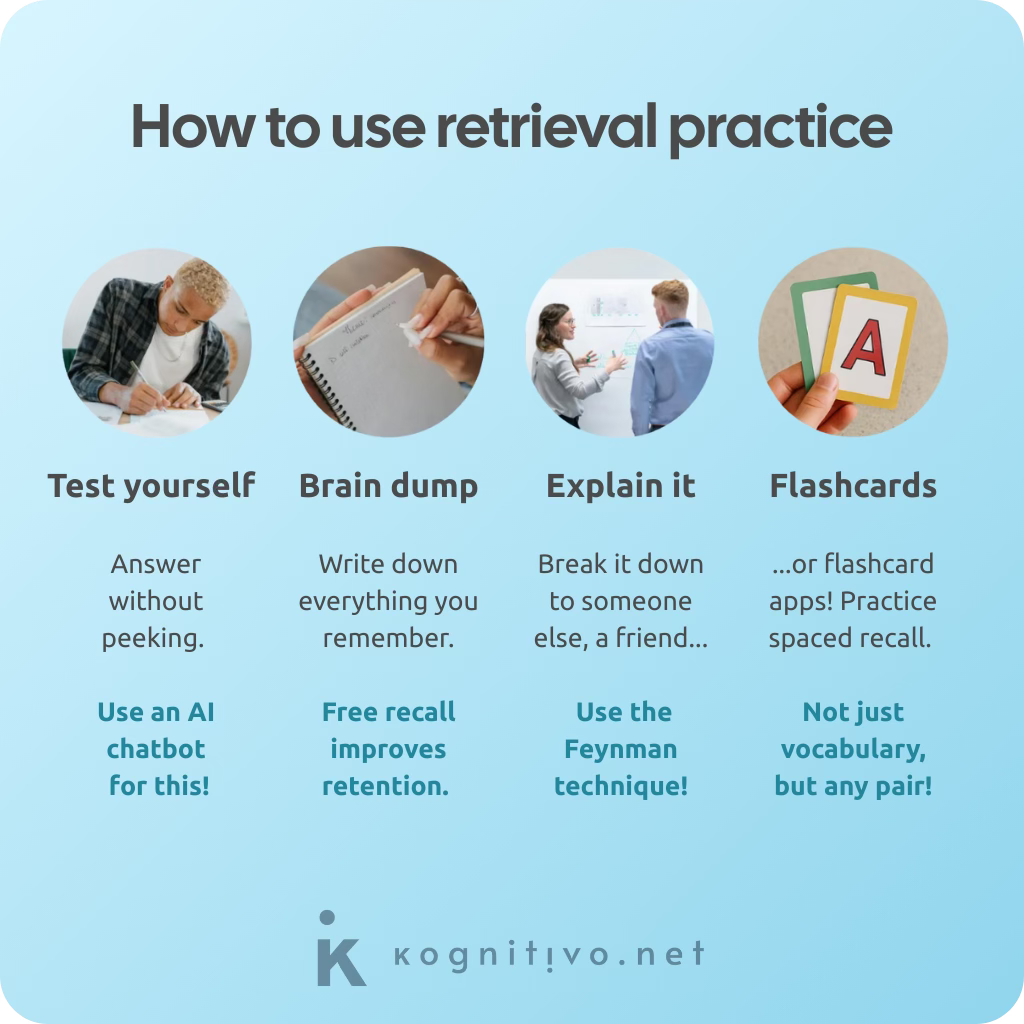Retrieval practice: the science of pulling out knowledge to build memory
Many people think tests are the source of all evil in education, but it turns out they’re one of the best ways to study. Let's unpack the science behind retrieval practice.
You’re sitting in a meeting, staring blankly at your notes.
Someone asks a question you definitely studied for yesterday. Your brain, however, is auditioning for the role of a tumbleweed in a desert. Nothing. Nada. I call this the “I-knew-this-yesterday” crisis.
This moment of mental betrayal isn’t about you being lazy or distracted. It’s about the gap between having read something many times and being able to recall it when it matters. And that’s where our main character enters the scene: retrieval practice. The unsung hero of actual learning.
What is retrieval practice?
Retrieval practice is the act of actively pulling information out of your brain, rather than passively stuffing it in. It’s what you do when you quiz yourself, do a brain dump or explain the concept of photosynthesis to your dog like you're guest lecturing at MIT.
So, am I saying that pulling information out of your brain makes learning better? Yes, I am.
It feels intuitive to think of learning as putting stuff into your brain (read, watch, highlight, repeat), but this is only the very first step. Of course, you do need that first exposure: reading or watching is how information gets into your brain in the first place (this is called encoding; and how you do that also matters). But to make information stick, that’s far from enough!
Science shows us that it’s the act of pulling information out of your brain (recalling) that strengthens memory. It’s by training that very skill that you’ll be able to recall information when you need it.
You don’t get better at remembering by cramming.
You get better by remembering.
The illusion of fluency
Retrieval practice feels harder than rereading. That difficulty is the mechanism, not something to avoid. Your brain is working, struggling a bit, and that very struggle is what makes memories stick.
When you reread or rewatch, your brain gets tricked into a false sense of “I got this.” Psychologists call it the illusion of fluency. Familiarity with the text is mistakenly assumed to mean mastery. You can see how that’s nonsense: it’s like watching someone else do push-ups and expecting your arms to get toned.
Pretty much every study on the topic agrees: rereading or rewatching is an inefficient study technique. Students who implement retrieval practice consistently outperform those who don’t.
Translation: testing yourself works.
💡 The right analogy: One of the reasons we misunderstand memory is the use of wrong analogies. Most people imagine their brain as an archive, a library or a warehouse; thinking learning is about “adding” new material to an “empty” space.
But your brain is more like a muscle: the more you practice recalling information, the stronger and more flexible it becomes.
Why your brain secretly loves this
So why does retrieval practice actually work?
It strengthens memory. Recalling activates the neurons linked to that memory, reinforcing their synaptic connections.
It makes future retrieval easier. Retrieval also helps your brain know where to look next time.
It helps you find blind spots. When you’re practicing retrieval and there’s a part of a topic you can’t recall, you become aware that you don’t know it yet!
It’s basically a cognitive workout. And yes, your brain likes to sweat a little. Sorry.
How to use it
Here are some suggestions:
Test yourself! The simplest way to practice retrieval is to mimic an exam setting. Grab a list of questions and try answering them (no peeking at your notes!).
By the way, you can ask an AI chatbot to test you on any topic. This might be one of the best uses of AI in education! (Find a prompt suggestion in the section Keep learning below.)
Do a brain dump after reading or watching something: write down everything you remember.
Brain dumps (also called free recall or initial retrieval attempts) are backed by research as an excellent study technique. Even without feedback (just attempting to recall), they improve retention long-term. It might feel silly, but it works.
Explain a concept to someone else: preferably someone who’ll challenge your vague answers, but a pet is better than nothing.
This, by the way, is called the Feynman technique, named after a Nobel-prize winning physicist who was famous for explaining complex topics in plain language. Be like Richard Feynman!
Use flashcards or flashcard apps. They’re a classic for a reason. Apps like Anki, Quizlet or Memrise help you space out practice over time.
Flashcards aren’t just for vocabulary! You can pair anything: question-answer, process-steps, concept-details...
Usual mistakes
Here are the three most common mistakes people make with retrieval practice:
Only practicing what you already know. If you only do comfort-review, that’s not studying: that’s karaoke.
Checking the answer immediately. Sit with the discomfort, it does you good. If you can’t even wait 30 seconds, maybe it’s not your memory that needs training...
Mistaking recognition for recall. Recognition is your brain pulling a “trust me, bro”.
By the way, the opposite is true too: if you don’t want to remember something, the best strategy is to stop retrieving it. Am I suggesting you quit thinking about your toxic ex? Science says what it says… Britney too.
Embrace tests
This brings us to a counterintuitive conclusion. When you’re taking a test or exam, you’re not just being assessed… you’re also learning.
Your knowledge of the content is actually better (stronger and more durable) after finishing an exam than it was before, thanks to the intense retrieval that happens during it.
Despite their scary reputation, tests are a powerful learning tool. Yes, they cause anxiety. Yes, we can and should talk about improving testing environments.
But from a learning perspective alone? Testing works.
Bear in mind: the goal of learning isn’t to store information. It’s to be able to retrieve it when life, exams or your boss calls on you. That’s why your study time should already look like the performance you’re training for: active retrieval.
Thank you for reading!
If you made it this far without testing yourself… well, what can I say? Shame on you. Subscribe anyway!
And remember: smart isn’t something you are, it’s something yo do!
Keep learning
Nerd out with AI
Prompt suggestions. Always ask follow-up questions
Always ask follow-up questions:
Act as a teacher and test me using retrieval practice on the topic of “the effectiveness of retrieval practice as a study technique”. Ask me 10 questions, one at a time, only proceeding when I answer each one. Make the questions progressively harder.
I read in a blog that "pretty much every study on the topic indicates that rereading or rewatching is a pretty inefficient study technique". Is that true? I’d like to know more about this.
If retrieval practice is such a good study technique, why are so many educators opposed to tests and exams?
Tests and exams give me anxiety, how can I implement retrieval practice in my learning routines without feeling anxious?
Links
Test-enhanced learning: taking memory tests improves long-term retention: This is one of the most satisfying studies on the topic: researchers Roediger and Karpicke found in 2006 that students who took practice tests remembered more over time than those who just reread.
Make it stick! The science of successful learning: This wonderful book from 2014 by Brown, Roediger (the same) and McDaniel explains in a very accessible way many of the key concepts of cognitive science (it’s one of the inspirations for this blog!): it explains the importance and effectiveness of retrieval practice in great detail.






I didnt know brain dump improves retention… I’ve been doing it since dear diary- 😭✨